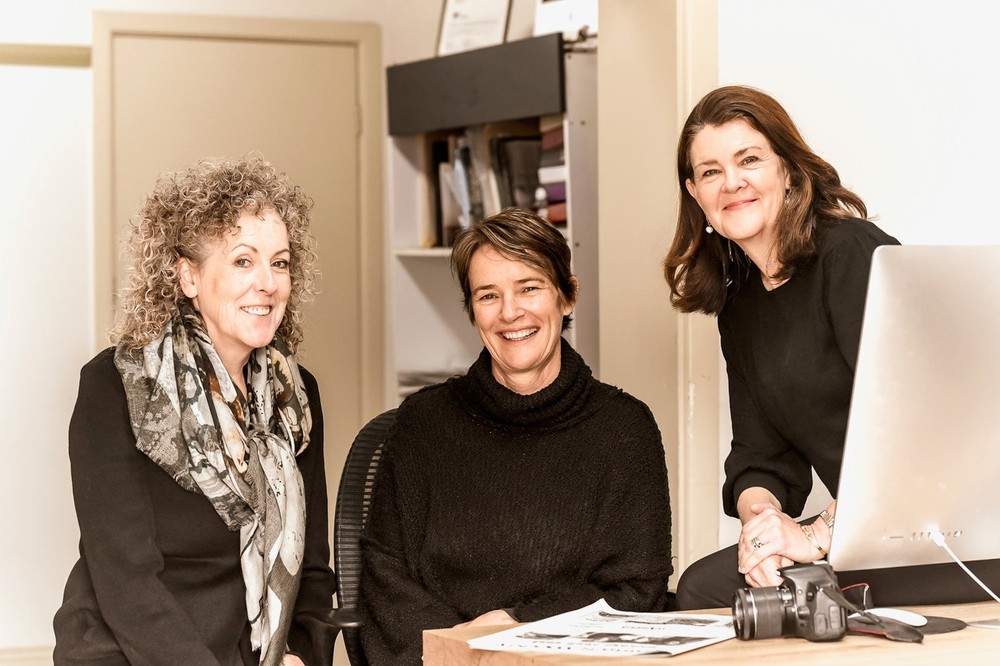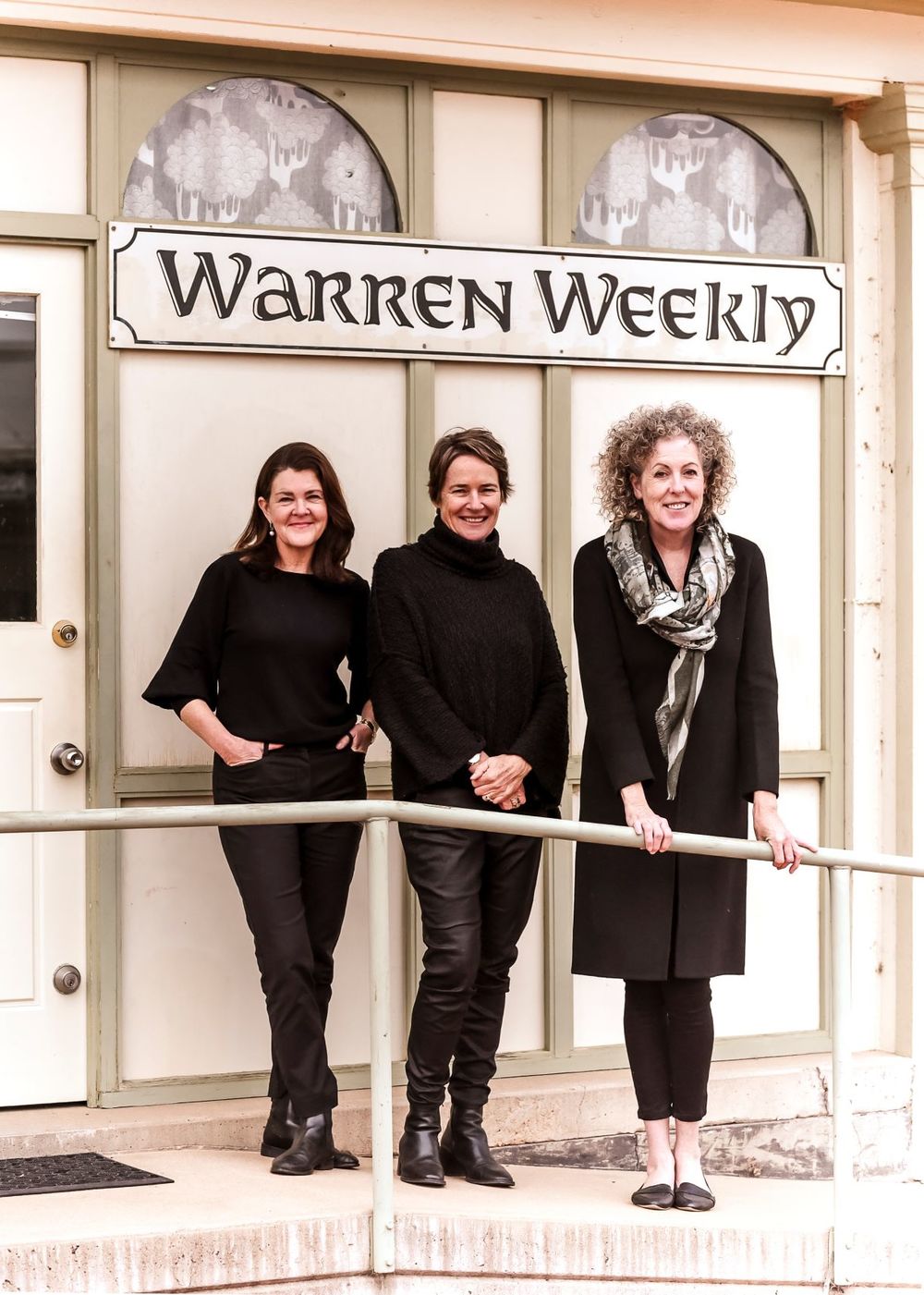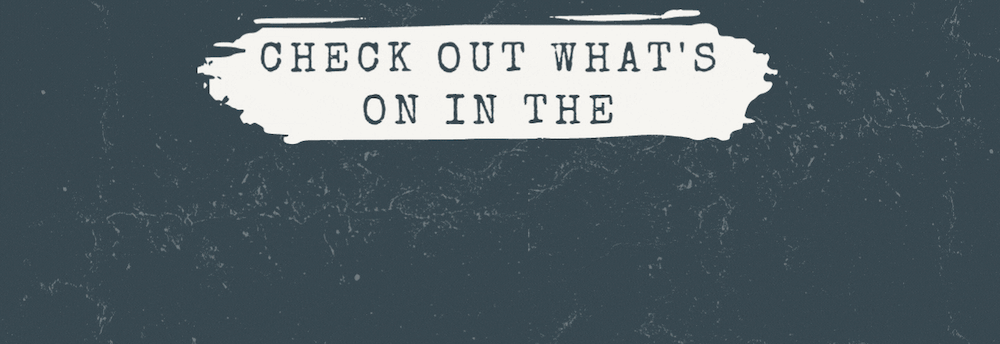End of an era for Warren Weekly
Lee O'Connor
03 July 2022, 8:40 PM
 The job-sharing trio Mel Irving, Audrey Weston and Ros Jackson have wound up their time at the Warren Weekly. PHOTO Belinda Dimarzio-Bryan
The job-sharing trio Mel Irving, Audrey Weston and Ros Jackson have wound up their time at the Warren Weekly. PHOTO Belinda Dimarzio-BryanThey say all good things must come to an end and while the unique collaboration that has kept Warren's local newspaper in print for the past decade or so has officially ended it doesn't necessarily spell the end of the Warren Weekly.
The publication's three person team of Audrey Weston, Melissa Irving and Ros Jackson put down their notebooks and cameras on Wednesday 29 June after a typically collective decision to relinquish their shared role and head in separate directions.
The trio have job-shared the one journalist / editor / business manager position at the Warren Weekly for almost ten years, a rare achievement in the publishing industry - or any industry at all for that matter - but there was little fanfare as they wound up in the aftermath of their final edition.
"Our last week was business as usual," Mrs Weston told the Western Plains App. "We had a visit from the View Club ladies and calls from friends of the paper but it was quite an anti-climax to walk out the door."
Like many local community newspapers the Warren Weekly's story is one of highs and lows with triumphs and tribulations.
Our sources tell us that the cheeky independent first went to print in 1985 after the business was established by the Warren Promotions & Development Association, a group of community-minded individuals who wanted an alternative to the Warren Advocate then owned by Rural Press/Fairfax, in order to keep retail trade in the town and strengthen the local economy.
According to past Chairman Ron Plunkett in a piece published in the Warren Weekly at the time of their 21st birthday, the plan was "to start a local newspaper so local people could communicate and build the social and commercial capital that was the lifeblood of the community."
The Warren Weekly certainly outlasted the Warren Advocate which printed its final edition in 2012.
The first editor was Jan Willets and, in 1987, the Warren Weekly bought Central Western Print.
Current owner Rosalie Hunt says although her knowledge of the history is sketchy, she believes her family, the Healeys, first bought the business when it was centred around the printing enterprise which undertook commercial work and also printed both the Warren and Nyngan newspapers.
"They bought the printing business and the papers were attached," Mrs Hunt said. "That worked well until the printer in charge decided to embark on a 'private project' and had to leave."
According to local lore the 'private project' of the print manager was to print what prosecutors were said to have described as 'very good quality' counterfeit money, but the enterprise was short-lived as the person involved was caught.
"It was very hard to find another printer with those traditional skills so the printery closed down and the newspapers were forced to relocate their printing to Gilgandra, which was the closest printing press," Mrs Hunt said. "In the end we were left with the newspaper and we've been very fortunate to have long term employees."
After Jan Willets moved on in 1988 the Warren Weekly was operated by Sue Harvey, who skilfully managed her own succession when the time came to leave.

Ros, Audrey and Mel have become some of the most familiar faces around the Warren area. PHOTO Belinda Dimarzio-Bryan
"I'd been submitting bits and pieces to the paper because at different times I was the publicity officer for the preschool, P&C, tennis club and arts council and we wanted to get our information out," said Mrs Weston.
"I coveted a job at the paper and when my children were at an age for me to re-enter the workforce I approached Sue and said if she ever had a position I'd be interested."
"When the time came that she was looking to retire Sue approached me," she said. "That was in 2011 and we worked together for about six months."
Mrs Weston then shared the role with Cara Vasilescu for around two years and when Cara left Ros Jackson and Melissa Irving came on board at around the same time in 2013.
"It was still the one position as Editor-and-Everything," Mrs Weston said.
This was the beginning of a unique triple-split job-share where each woman worked set days, with tasks dictated by the day of the week (deadline day, printing and distribution day, back of house day) and the skills and interests of each person.
Although none of the three had had formal journalism training they each brought with them high level organisational, business and communication skills which stood them in good stead as they learned the ropes, set the course and delivered a quality weekly product to their readers and advertisers.
"Everybody writes," Mrs Weston said. "If a story came in on your day you'd write it because you didn't want to leave anything hanging over."
Melissa Irving says that the arrangement could only work if they worked well as a team.
"We would communicate each night on whatever we were working on," she said. "The job-sharing has definitely been a strength in this role because we had more eyes and ears on the ground."
All three women say that they feel they have been part of something important in their local community.
"The newspaper is something that gives people that sense of connectedness," Mrs irving said. "Even in the pandemic we kept the newspaper going and I'm really proud about that."
"It helps create a sense of belonging and that's one of the main things that everybody needs."
"A community newspaper creates that in-depth connection and because I also work in the town library, I get to see how important newspapers are in the long term because we have a constant stream of people looking for their family or local history."
"It gives you access to the social history, beyond the basic statistics of births, deaths and marriages."
"Every edition of the newspaper is a snapshot of life in Warren that week and without newspapers we won't have that recorded history. Being involved in recording history has been very satisfying," she said.
Ros Jackson says the whole team has prided themselves on ensuring that diverse parts of the community were represented in the paper.
“One thing that I have loved about working at the Weekly is having had the opportunity to meet and connect with so many different segments of the community," she said. "You get to know different people, hear their stories and have the privilege of sharing those stories, including those that might not otherwise be told.
"The newspaper is really important for connecting the generations," said Mrs Jackson. "We make sure that people have a way of feeling like they are part of the community by helping them to keep up with and connect with others.
"As a society, we do tend to place an over-reliance on social media but really it is just bites of information that disappear down the news feed within minutes. That’s why we always liked to describe our content as being, ’the story behind the story’.
"Those stories form part of the fabric of a community like Warren," she said. "The paper helps you to understand and celebrate the strengths of communities like ours."
"Communities can become very siloed and you could live a few kilometres from someone and not know what's really going on but you can see their story in the paper and that they're just like you."
While technology has presented challenges, the ladies say that it has also helped streamline news gathering and magnified community involvement by allowing them to share information through texts and even photos.
"I will miss so much about it," Audrey Weston said. "It's been a dream job. We were embedded in the community, hearing about stories or seeking them out. It's that connection with what's going on and the feeling of being integral to sharing the community's stories and recording the history.
"We were trusted with a lot of information you wouldn't be if you didn't work for the paper, and you had to share it in a responsible way," she said.
"The places you go and the people you see - young, old, all different ages and backgrounds - it's a great job for that."

PHOTO Belinda Demarzio-Bryan
Mrs Hunt says that while there will be a hiatus while the newspaper finds its new direction, she is hopeful for the future.
"We have been blessed with a lot of long term employees, and their capability is so good it seems daunting to replace them," she said. "They've done an admirable job to produce the paper, especially through all the difficult times like drought, flood and covid - and every week they've produced a paper.
"I hope going forward to get the paper back into production as soon as possible to service the community and our advertisers and contributors into the future."
"I think local newspapers are inherently important to our rural and remote towns and a large percentage of the population still appreciate the feel of a printed paper.
"Also I think the government recognises the importance of a local paper to keep people engaged with their own community. We can all be isolated or drawn away by shopping out of town or children away at school or many other reasons, and without the paper we might otherwise get disconnected within our own community.
"I think inherently we all like to know how our community is travelling and that can only come by disseminating information that has been sourced locally," Mrs Hunt said.
"It's a very important role and these ladies have done a sterling job."




